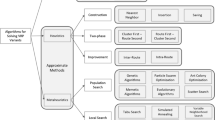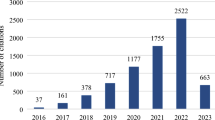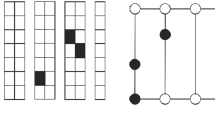Abstract
This paper discusses a solution procedure of a multi-objective capacitated transportation problem (MOCTP) in an uncertain environment. In MOCTP, the primary objective is to find the optimum quantity of the shipment subject to some capacitated restriction on each route. Due to uncertainty in MOCTP, the formulated problem cannot be solved directly for the optimum allocation. The uncertainty in MOCTP has been presented by the multi-choices and probabilistic distributions, respectively. The multi-choice and probabilistic distributions have been transformed into an equivalent deterministic form using the binary variable and stochastic programming approach, respectively. It has been assumed that the demand and supply parameter of the formulated problem follows different kinds of probabilistic distributions, namely, Pareto, Weibull, Normal, Extreme value, Cauchy and Logistic distribution, respectively. The maximum likelihood estimation approach has been used to estimate the unknown parameters of the probabilistic distributions with specified probability level. Finally, Akaike’s information criterion and Bayesian information criterion have been used to identify the goodness-of-fit of probability distributions for the given scenarios. The fuzzy goal-programming technique has been used to obtain the best optimum compromise solution for an equivalent crisp MOCTP model. A case study has been given to illustrate the computational procedure.


Similar content being viewed by others
References
Acharya S, Biswal MP (2016) Solving multi-choice multi-objective transportation problem. Int J Math Oper Res 8(4):509–527
Arora SR, Gupta K (2011) An algorithm for solving a capacitated fixed charge bi-criterion indefinite quadratic transportation problem with restricted flow. Int J Res IT Manag Eng 1(5):123–140 (ISSN 2249-1619)
Arora R, Thirwani D (2013) Bilevel capacitated fixed charge transportation problem. Adv Model Optim 15(3):645–669
Barik SK (2015) Probabilistic fuzzy goal programming problems involving pareto distribution: some additive approaches. Fuzzy Inf Eng 7(2):227–244
Barik SK, Biswal MP, Chakravarty D (2011) Stochastic programming problems involving pareto distribution. J Interdiscip Math 14(1):40–56
Biswal MP, Acharya S (2009) Multi-choice multi-objective linear programming problem. J Interdiscip Math 12(5):606–637
Biswal M, Acharya S (2011) Solving multi-choice linear programming problemsby interpolating polynomials. Math Comput Model 54(5):1405–1412
Biswal MP, Biswal NP, Li D (1998) Probabilistic linear programming problems with exponential random variables: a technical note. Eur J Oper Res 111(3):589–597
Biswas A, De AK (2017) A unified method of defuzzification for type-2 fuzzy numbers with its application to multiobjective decision making. Granul Comput. https://doi.org/10.1007/s41066-017-0068-z
Biswas A, Modak N (2011) A fuzzy goal programming method for solving chance constrained programming with fuzzy parameters. In: Balasubramaniam P (eds) Control, computation and information systems. Springer, Berlin, pp 187–196. https://doi.org/10.1007/978-3-642-19263-0_23
Bit AK, Biswal MP, Alam SS (1992) Fuzzy programming approach to multicriteria decision making transportation problem. Fuzzy Sets Syst 50(2):135–141
Bit AK, Biswal MP, Alam SS (1993) Fuzzy programming technique for multi-objective capacitated transportation problem. J Fuzzy Math 1(2):367–376
Chang CT (2007) Multi-choice goal programming. Omega 35(4):389–396
Chang CT (2008) Revised multi-choice goal programming. Appl Math Model 32(12):2587–2595
Dahiya K, Verma V (2007) Capacitated transportation problem with bounds on rim conditions. Eur J Oper Res 178(3):718–737
Dutta D, Murthy S (2010) Multi-choice goal programming approach for a fuzzy transportation problem. IJRRAS 2(2):132–139
El-Wahed WFA (2001) A multi-objective transportation problem under fuzziness. Fuzzy Sets Syst 117(1):27–33
Garai T, Chakraborty D, Roy TK (2018) A fuzzy rough multi-objective multi-item inventory model with both stock-dependent demand and holding cost rate. Granul Comput. https://doi.org/10.1007/s41066-018-0085-6
Goicoechea A, Duckstein L (1987) Nonnormal deterministic equivalents and a transformation in stochastic mathematical programming. Appl Math Comput 21:51–72
Goicoechea A, Hansen DR, Duckstein L (1982) Multiobjective decision analysis with engineering and business applications. Wiley, New York
Gupta K, Arora SR (2012a) Restricted flow in a nonlinear capacitated transportation problem with bounds on rim conditions. Int J Res IT Manag Eng 2(5):226–243
Gupta K, Arora SR (2012b) An algorithm to find optimum cost time trade-off pairs in a fractional capacitated transportation problem with restricted flow. Int J Res Soc Sci 2(2):418
Gupta K, Arora SR (2012c) Optimum cost-time trade-off in a capacitated fixed charge transportation problem with bounds on rim conditions. Int J Phys Soc Sci 2(8):287–306
Gupta K, Arora SR (2012d) Paradox in a fractional capacitated transportation problem. Int J Res IT Manag Eng 2(3):43–64
Gupta K, Arora SR (2013) Bottleneck capacitated transportation problem with bounds on rim conditions. Opsearch 50(4):491–503
Gupta N, Bari A (2014) Fuzzy multi-objective capacitated transportation problem with mixed constraints. J Stat Appl Probab 3(2):1–9
Gupta N, Ali I, Bari A (2013) A compromise solution for multi-objective chance constraint capacitated transportation problem. ProbstatForum 6(1):60–67
Gupta S, Ali I, Ahmed A (2018a) Multi-objective capacitated transportation problem with mixed constraint: a case study of certain and uncertain environment. OPSEARCH. https://doi.org/10.1007/s12597-018-0330-4
Gupta S, Ali I, Ahmed A (2018b) Multi-choice multi-objective capacitated transportation problem—a case study of uncertain demand and supply. J Stat Manag Syst 21(3):467–491
Hassin R, Zemel E (1988) Probabilistic analysis of the capacitated transportation problem. Math Oper Res 13(1):80–89
Hitchcock FL (1941) The distribution of a product from several sources to numerous localities. J Math Phys 20(1):224–230
Kaur P, Verma V, Dahiya K (2017) Capacitated two-stage time minimization transportation problem with restricted flow. RAIRO Oper Res 51(2):447–467
Khalil TA, Raghav YS, Badra N (2016) Optimal solution of multi-choice mathematical programming problem using a new technique. Am J Oper Res 6(1):167–172
Khurana A, Verma T, Arora SR (2012) An algorithm for solving time minimizing capacitated transshipment problem. Int J Manag Sci Eng Manag 7(3):192–199
Koopmans TC, Reiter S (1951) A model of transportation. In: Koopmans TC (ed) Activity analysis of production and allocation—Proceedings of a conference. Wiley, New York, pp 222–259
Li L, Lai KK (2000) A fuzzy approach to the multi-objective transportation problem. Comput Oper Res 27(1):43–57
Liu B (2007) Uncertainty theory. In: Uncertainty theory, vol 154. Springer, Berlin. https://doi.org/10.1007/978-3-540-73165-8_5
Liu B (2010) Uncertainty theory: a branch of mathematics for modeling human uncertain. Springer, Berlin. https://doi.org/10.1007/978-3-642-13959-8
Liu S, Xu Z, Gao J (2017) A fuzzy compromise programming model based on the modified S-curve membership functions for supplier selection. Granul Comput. https://doi.org/10.1007/s41066-017-0066-1
Lohgaonkar MH, Bajaj VH (2010) Fuzzy approach to solve multi-objective capacitated transportation problem. Int J Bioinform Res 2(1):10–14
Mahapatra DR, Roy SK, Biswal MP (2013) Multi-choice stochastic transportation problem involving extreme value distribution. Appl Math Model 37(4):2230–2240
Maity G, Kumar Roy S (2016) Solving a multi-objective transportation problem with nonlinear cost and multi-choice demand. Int J Manag Sci Eng Manag 11(1):62–70
Maity G, Roy SR (2014) Solving multi-choice multi-objective transportation problem: a utility function approach. J Uncertain Anal Appl 2:11
Moanta D (2007) Some aspects on solving a linear fractional transportation problem. J Appl Quant Methods 2(3):343–348
Pedrycz W, Chen SM (2011) Granular computing and intelligent systems: design with information granules of high order and high type. Springer, Heidelberg
Pedrycz W, Chen SM (2015a) Granular computing and decision-making: interactive and iterative approaches. Springer, Heidelberg
Pedrycz W, Chen SM (2015b) Information granularity, big data, and computational intelligence. Springer, Heidelberg
Pramanik S, Banerjee D (2012) Multi-objective chance constrained capacitated transportation problem based on fuzzy goal programming. Int J Comput Appl 44(20):42–46
Roy SK (2014) Multi-choice stochastic transportation problem involving Weibull distribution. Int J Oper Res 21(1):38–58
Roy SK (2016) Transportation problem with multi-choice cost and demand and stochastic supply. J Oper Res Soc China 4(2):193–204
Roy SK, Mahapatra DR, Biswal MP (2012) Multi-choice stochastic transportation problem with exponential distribution. J Uncertain Syst 6(3):200–213
Sadia S, Gupta N, Ali QM (2016) Multiobjective capacitated fractional transportation problem with mixed constraints. Math Sci Lett 5(3):235–242
Safi M, Ghasemi SM (2017) Uncertainty in linear fractional transportation problem. Int J Nonlinear Anal Appl 8(1):81–93
Sahoo NP, Biswal MP (2005a) Computation of some stochastic linear programming problems with Cauchy and extreme value distributions. Int J Comput Math 82(1):685–698
Sahoo NP, Biswal MP (2005b) Computation of probabilistic linear programming problems involving normal and log-normal random variables with a joint constraint. Comput Math 82(11):1323–1338
Sharma V, Dahiya K, Verma V (2010) Capacitated two-stage time minimization transportation problem. Asia Pac J Oper Res 27(4):457–476
Sheng Y, Yao K (2012a) Fixed charge transportation problem and its uncertain programming model. Ind Eng Manag Syst 11(2):183–187
Sheng Y, Yao K (2012b) A transportation model with uncertain costs and demands. Int Inf Inst (Tokyo) Inf 15(8):3179
Swarup K (1965) Linear fractional functionals programming. Oper Res 13(6):1029–1036
Swarup K (1966) Transportation technique in linear fractional functional programming. J R Nav Sci Serv 21(5):256–260
Wagner HM (1959) On a class of capacitated transportation problems. Manag Sci 5(3):304–318
Zangiabadi M, Maleki HR (2013) Fuzzy goal programming technique to solve multiobjective transportation problems with some non-linear membership functions. Iran J Fuzzy Syst 10(1):61–74
Zheng HR, Xu JM, Hu ZM (1994) Transportation problems with upper limit constraints on the variables and with parameters. J Wuhan Univ Nat Sci Ed 5(1):1–5
Zimmermann HJ (1978) Fuzzy programming and linear programming with several objective functions. Fuzzy Sets Syst 1:45–55
Author information
Authors and Affiliations
Corresponding author
Additional information
Publisher’s Note
Springer Nature remains neutral with regard to jurisdictional claims in published maps and institutional affiliations.
Rights and permissions
About this article
Cite this article
Gupta, S., Ali, I. & Chaudhary, S. Multi-objective capacitated transportation: a problem of parameters estimation, goodness of fit and optimization. Granul. Comput. 5, 119–134 (2020). https://doi.org/10.1007/s41066-018-0129-y
Received:
Accepted:
Published:
Issue Date:
DOI: https://doi.org/10.1007/s41066-018-0129-y




